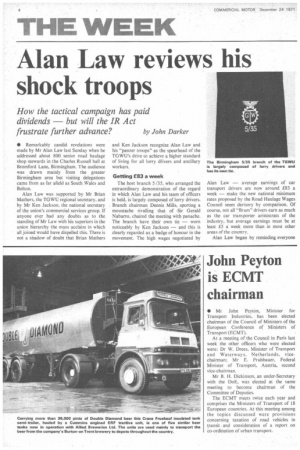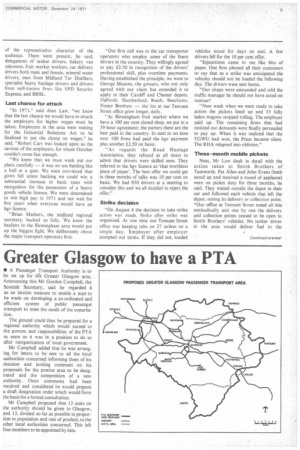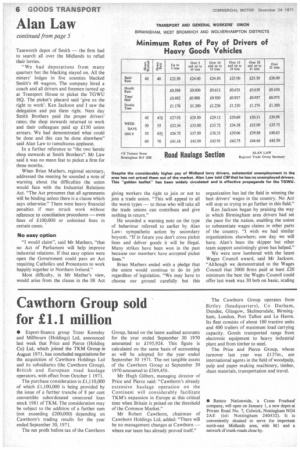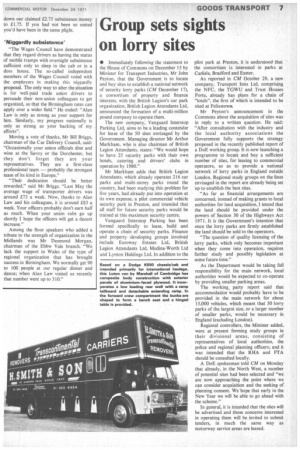Alan Law reviews his shock troops
Page 6

Page 7

Page 8

Page 9

If you've noticed an error in this article please click here to report it so we can fix it.
How the tactical campaign has paid dividends — but will the IR Act frustrate further advance? by John Darker
• Remarkably candid revelations were made by Mr Alan Law last Sunday when he addressed about 800 senior road haulage shop stewards in the Charles Russell hall at Broinford Lane, Birmingham. The audience was drawn mainly from the greater Birmingham area but visiting delegations came from as far afield as South Wales and Bolton.
Alan Law was supported by Mr Brian Mathers, the TGWU regional secretary, and by Mr Ken Jackson, the national secretary of the union's commercial services group. If anyone ever had any doubts as to the standing of Mr Law with his superiors in the union hierarchy the mass acclaim in which all joined would have dispelled this. There is not a shadow of doubt that Brian Mathers and Ken Jackson recognize Alan Law and his "panzer troops" as the spearhead of the TGWU's drive to achieve a higher standard of living for all lorry (Rivers and ancillary workers.
Getting £83 a week
The host branch 5/35. who arranged the extraordinary demonstration of the regard in which Alan Law and his team of officers is held, is largely composed of lorry drivers. Branch chairman Dennis Mills, sporting a moustache rivalling that of •Sir Gerald Nabarro, chaired the meeting with panache. The branch have their own tic — worn noticeably by Ken Jackson — and this is clearly regarded as a badge of honour in the movement. The high wages negotiated by
Alan Law — average earnings of car transport drivers are now around £83 a week — make the new national minimum rates proposed by the Road Haulage Wages Council seem derisory by comparison. Of course, not all -Brumdrivers earn as much as the car transporter aristocrats of the industry, but average earnings must be at least £5 a week more than in most other areas of the country.
Alan Law began by reminding everyone of the representative character of the audience. There were present, he said, delegations of tanker drivers, bakery van salesmen, fruit market workers, car delivery drivers both male and female, mineral water drivers, men from Midland Tar Distillers, specialist heavy haulage drivers and drivers from well-known firms like SPD Security Express, and BRSL.
Last chance for attack
-In 1971," said Alan Law, "we knew that the last chance we would have to attack the employers for higher wages must be taken. Employers in the area were waiting for the Industrial Relations Act to be finalized to put the clamp on wages," he said. -Robert Carr was looked upon as the saviour of the employers, for whom October couldn't come fast enough.
"We knew that we must work out our plans carefully — it was no use battling like a bull at a gate. We were convinced that given full union backing we could win a substantial increase in basic rates with recognition for the possession of a heavy goods vehicle licence. We were determined to win high pay in 1971 and not wait for five years when everyone would have an hgv licence.
"Brian Mathers, the midland regional secretary, backed us fully. We knew the hauliers in the Birmingham area would put up the biggest fight. We deliberately chose the major transport operators first.
"Our first call WAS to the car transporter operators who employ some of the finest drivers in the country. They willingly agreed to pay £2.50 in recognition of the drivers' professional skill, plus overtime payments. Having established the principle, we went to George Masons, the grocers, who not only agreed with our claim but extended it to apply to their Cardiff and Chester depots. Halfords. Slumberland. Reeds. Beechams. Foster Brothers — the list at our Tennant Street office grew longer, daily.
"At Birmingham fruit market where we have a 100 per cent closed shop, we put in a 39-hour agreement; the porters there are the best paid in the country. In next to no time over 100 firms had paid the hgv payment plus another £2.50 on basic.
"As regards the Road Haulage Association, they refused at all times to admit that drivers were skilled men. They referred to the hgv licence as 'that worthless piece of paper'. The best offer we could get in three months of talks was 10 per cent on basic. We had 850 drivers at a meeting to consider this and we all decided to reject the offer."
Strike decision "On August 4 the decision to take strike action was made. Strike after strike was organized. At one time our Tennant Street office was keeping tabs on 27 strikes on a single day. Employer after employer accepted our terms. If they did not, loaded vehicles stood for days on end. A few drivers fell for the 10 per cent offer.
"Injunctions came to me like bits of paper. One firm phoned all their customers to say that as a strike was anticipated the vehicles should not be loaded the following day. The drivers were sent home.
"Our chaps were astounded and told the traffic manager he should not have acted on rumour!
"Next week when we were ready to take action the pickets lined up and 55 fully laden wagons stopped rolling. The employer paid up. The remaining firms that had resisted our clemands were finally persuaded to pay up. When it was realized that the TGWU had won, the Press became silent. The RHA relapsed into oblivion."
Three-month mobile pickets
Next, Mr Law dealt in detail with the action taken at Smith Brothers of Tamworth. Pat Allen and John Evans (both stood up and received a round of applause) were on picket duty for three months, he said. They waited outside the depot in their car and followed each vehicle that left the depot, noting its delivery or collection point. "Our office at Tennant Street noted all this methodically and one by one the delivery and collection points ceased to be open to Smith Brothers' vehicles. No tanker driver in the area would deliver fuel to the Tamworth depot of Smith — the firm had to search all over the Midlands to refuel their lorries.
"We had deputations from many quarters but the blacking stayed on. All the miners' lodges in five counties blacked Smith's 48 wagons. The company hired a coach and all drivers and foremen turned up at Transport House to picket the TGWU HQ. The picket's placard said `give us the right to work'. Ken Jackson and I saw the delegation and put them right. Next day Smith Brothers paid the proper drivers' rates; the shop stewards returned to work and their colleagues paid up £150 union arrears. We had demonstrated what could be done and this can be done elsewhere" said Alan Law to tumultuous applause.
In a further reference to "the two heroic shop stewards at Smith Brothers". Mr Law said it was no mean feat to picket a firm for three months.
When Brian Mathers, regional secretary, addressed the meeting he sounded a note of warning about the difficulties the union would face with the Industrial Relations Act. "The Act presumes that all agreements will be binding unless there is a clause which says otherwise." There were heavy financial penalties if men struck work without reference to conciliation procedures — even fines of £100,000 or unlimited fines in certain cases. s No easy oOtion
"I would claim", said Mr Mathers, "that no Act of Parliament will help improve industrial relations. If that easy option were open the Government could pass an Act requiring Catholics and Protestants to work happily together in Northern Ireland."
Most difficulty, in Mr Mather's view, would arise from the clause in the IR Act
giving workers the right to join or not to join a trade union. "This will appeal to all the worst types — to those who will take all the trade unions can contribute and give nothing in return."
He sounded a warning note on the type of behaviour referred to earlier by Alan Law: sympathetic action by secondary boycott. "If in future you don't cross picket lines and deliver goods it will be illegal. Many strikes have been won in the past because our members have accepted picket lines."
Brian Mathers ended with a pledge that the union would continue to do its job regardless of legislation. "We may have to choose our ground carefully but this organization has led the field in winning the best drivers' wages in the country. No Act will stop us trying to go further in this field."
Ken Jackson began by praising the way in which Birmingham area drivers had set the pace for the nation, enabling the union to substantiate wages claims in other parts of the country. "I wish we had similar organizations elsewhere; one day we will have. Alan's been the skipper but other team support unstintingly given has helped."
We were now lumbered with the latest Wages Council award, said Mr Jackson. "Although we demonstrated to the Wages Council that 2000 firms paid at least £20 minimum the best the Wages Council could offer last week was 30 bob on basic, scaling down our claimed £2.75 subsistence money to £1.75. If you had not been so united you'd have been in the same plight.
'Niggardly subsistence'
"The Wages Council have demonstrated that they regard drivers as having the status of mobile tramps with overnight subsistence sufficient only to sleep in the cab or in a doss house. The so-called independent members of the Wages Council voted with the employers in making this niggardly proposal. The only way to alter the situation is for well-paid trade union drivers to persuade their non-union colleagues to get organized, so that the Birmingham rates can apply over a wider field." He ended: "Alan Law is only as strong as your support for him. Similarly, my progress nationally is only as strong as your backing of my . efforts".
Moving a vote of thanks, Mr Bill Briggs, chairman of the Car Delivery Council, said: "Occasionally your union officials dine and wine at the Savoy or the Dorchester. but they don't forget they are your representatives. They are a first-class professional team — probably the strongest team of its kind in Europe."
"Their dedication should be better rewarded," said Mr Briggs. "Last May the average wage of transporter drivers was around £73 a week. Now, thanks to Alan Law and his colleagues, it is around £83 a week. Your officers probably don't earn half as much. When your union subs go up shortly I hope the officers will get a decent increase."
Among the floor speakers who added a tribute to the strength of organization in the Midlands was Mr Desmond Morgan, chairman of the Ebbw Vale branch. "We lack the support in Wales of the type of regional organization that has brought success in Birmingham. We normally get 90 to 100 people at our regular dinner and dance; when Alan Law visited us recently that number went up to 310."




































































